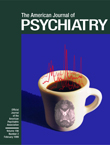Clozapine and Risperidone in Chronic Schizophrenia: Effects on Symptoms, Parkinsonian Side Effects, and Neuroendocrine Response
Abstract
OBJECTIVE: Clozapine and risperidone were the first two “second-generation” antipsychotic drugs approved for schizophrenia. There is currently little information about their comparative efficacy from head-to-head clinical trials. The purpose of this study was to examine the comparative efficacy of clozapine and risperidone for positive and negative symptoms, depression, parkinsonian side effects, and indexes of neuroendocrine function in schizophrenic patients who met a priori criteria for partial response to traditional neuroleptic agents. METHOD: After a baseline fluphenazine treatment period, 29 patients participated in a 6-week, double-blind, parallel-group comparison of the effects of these agents. RESULTS: Clozapine was superior to risperidone for positive symptoms and parkinsonian side effects, but there were no significant differences between the drugs on two measures of negative symptoms, Brief Psychiatric Rating Scale total scores, and depression scores. The clozapine patients, but not the risperidone patients, demonstrated significant reductions from the fluphenazine baseline in positive symptoms, total symptoms, and depression. In addition, clozapine produced fewer effects on plasma prolactin than risperidone or fluphenazine. The mean daily doses during week 6 of the trial were 403.6 mg of clozapine and 5.9 mg of risperidone. CONCLUSIONS: The findings from this study indicate that these drugs have both important differences and similarities in their comparative efficacy in chronically ill, partially responsive patients with schizophrenia. Further research on second-generation antipsychotic drugs in this patient population that addresses key methodological issues, such as optimal dose and treatment duration, are needed.



